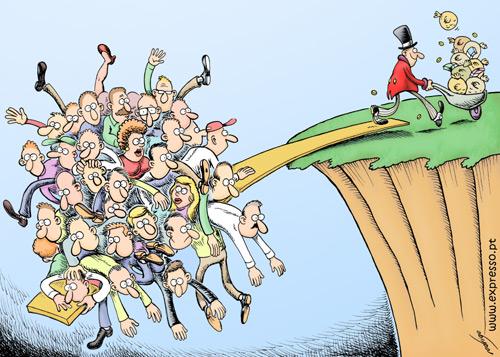Few days ago, I came across the blog post about the income inequality in the U.S. on Freakonomics. This issue has always been the concern of the society. One of my economics classes last semester touched on this issue, too. This seems to be a big deal to some groups of people, while it's does not really matter to the other groups.
Before moving further to the views of different groups of people on this issue, let's us look at some statistics on this. Since 1970s, income inequality has been increasing and the gap between the rich and the poor is getting bigger and bigger. "The rich get richer and the poor get poorer." This truly reflects the current situation of income inequality that is long existed in the history of the U.S. According to an article from the National Public Radio's website titled "Haves and Have-Nots: Income Inequality in America", the author points out that 8% of the nation's total income went to the richest 1% Americans, like Bill Gates, in year 1980. In year 2004, the statistics went up to 16%, which was double the percentage within 2 decades. He also argues that while the poor or the middle class are getting better in their standard of living over the 2 decades, the rich are just getting much much better.
This might seem to be a bad sign for the nation. Nonetheless, according to James PethoKoukis in his article published on U.S. News website, income inequality is a good sign for a nation. He argues that one of the major causes for wage inequality (which is part of the scenario of income inequality) is education. As the rise of new and advanced technology causes many jobs to be obsolete, people who are less educated and have little knowledge on technology will slowly be "kicked" out of the job world. For people in the computer-based or technology field, their role is getting significant to the market and hence, the unemployment rate of people in that field is decreasing over the years. Also, the demand for educated people is increasing. This indirectly shows that increasing income inequality is just a sign of better education for the nation.

On the other hand, Tyler Cowen claims in his article that many economists are still debating on whether there is any growth in inequality for people below the top-earning 1%. According to Cowen, "poorer people are more likely to shop at discount outlets like Wal-Mart" and this leaves us a question mark on whether the real income gaps between the poor and the middle class people has widen by any percentage at all. Robert J. Gordon from Northwestern University also shows that since 1993, there is no increase of inequality among people below the top 1% and this implies that the widening of the nation's income inequality is purely due to the changes in the income of top 1%.
So does income inequality matter to you? Something to ponder on.
Pool Browser APK gives players a smooth and enjoyable way to play online pool games on Android. Many users explore spin control for pool browser to improve precision and make each shot more accurate. The app is easy to navigate and helps track angles and ball movement clearly. It works well for both beginners and experienced players who want better control. Pool Browser is perfect for anyone looking to enhance their pool game experience.
ReplyDelete